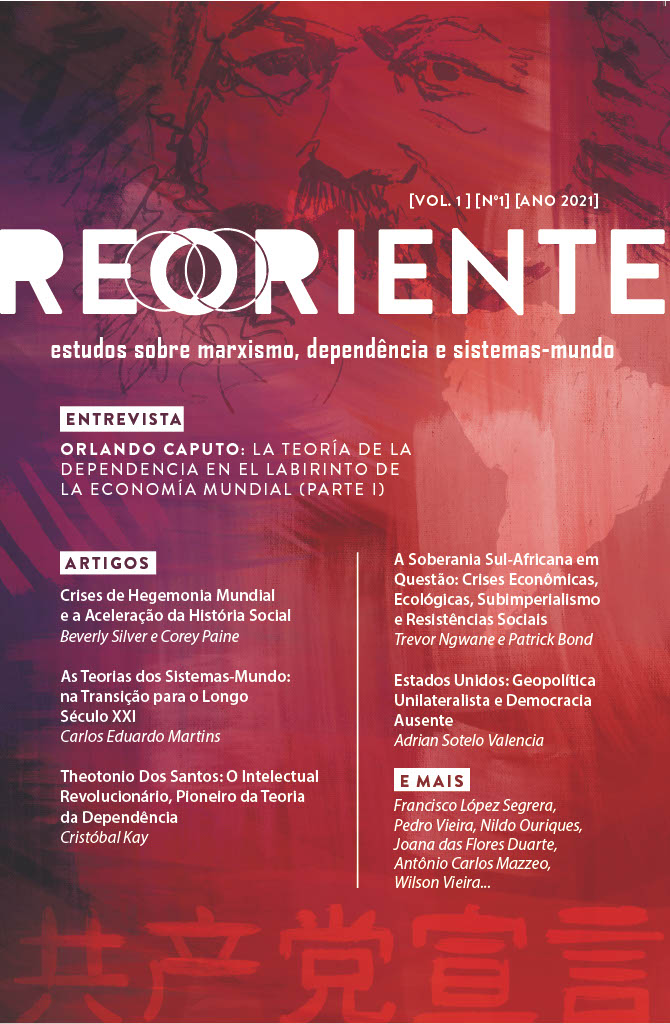Africa’s Shrinking Sovereignty: Economic Crises, Ecological Damage, Sub-Imperialism and Social Resistances
DOI:
https://doi.org/10.54833/issn2764-104X.v1i1p101-120Keywords:
África do Sul, Soberania, Crise, Subimperialismo, Resistências SociaisAbstract
The development of South Africa’s contemporary political economy occur- red in the context of a global capitalist order characterized by increasingly unequal political and economic relations between and within countries. Prior to liberation in 1994, many people around the world actively supported the struggle against apartheid. If the apartheid state was defeated, it retained enough strength to limit a radical tran- sition. Since 1994, diminished sovereignty means that the foreign influences of global capitalism amplify local socioeconomic contradictions in a way that is destructive to the vast majority of citizens. This is evident when one considers economic, ecological, geopolitical, and societal considerations.
References
AROA (Alternative Report on Africa). First issue terms of reference for country stu- dies. Unpublished paper. Dakar: ENDA, 2019.
AMIN, Samir. Delinking. London: Zed Books. 1990.
ACLED (Armed Conflict Location and Event Data Project). Dashboard. Brighton: University of Sussex, 2020. Disponível em: https://www.acleddata.com/dashboard.
AVERBACH, Mon. On Trotsky’s letter to South Africa. Re- volutionary History, v. 4, n. 4, p. 131-133, 1936.
BOND, Patrick. Elite Transition. London: Pluto Press, 2014.
BOND, Patrick; GALVIN, M. Water, food and climate commoning in South African cities. In: VIVERO-POL, José L.; FERRANDO, Tomaso et al. (ed.). Routledge Handbook of Food as a Commons. London: Routledge, 2019. p. 231-248. Disponível em: https://www.routledge.com/Routledge-Handbook-of-Food-as-a-Commons/Vivero-
-Pol-Ferrando-Schutter Mattei/p/book/9781138062627.
BOND, Patrick; MALIKANE, Christopher. Inequality caused by macro-economic po- licies during overaccumulation crisis. Development Southern Africa, v. 36, n. 6, p. 1-18, 2019. DOI: 10.1080/0376835X.2019.1701416.
EUROMONITOR. Income inequality ranking of the world’s major cities, 31 out. 2017. Disponível em: https://blog.euromonitor.com/income-inequality-ranking-worlds-ma- jor-cities/.
FINE, Ben. The minerals-energy complex is dead: Long live the MEC? Amandla Colloquium, 2008. Disponível em: http://www.amandlapublishers.co.za/component/option,- com_docman/task,cat_view/g id,100/Itemid,163/.
FINE, Ben; RUSTOMJEE, Zavareh. The Political Economy of South Africa. Johannesburg: Wits University Press, 1996.
INTERNATIONAL MONETARY FUND. Fiscal Monitor: managing public wealth. Washington, D.C., 2018. Disponível em: https://www.imf.org/~/media/Files/Publications/fiscal-monitor/2018/October/pdf/fm1802.ashx?la=en.
KEYNES, John Maynard. National self-sufficiency. The Yale Review, v. 22, n. 4, p. 755- 769, 1933. Disponível em: https://www.mtholyoke.edu/acad/intrel/interwar/keynes. htm.
KUHN, Annette; WOLPE, AnnMarie (ed.). Feminism and Materialism. London: Rout- ledge: Kegan Paul, 1978.
LE CORDEUR, Matthew. Eskom to waive Soweto users’ debt – On condition. Fin24, maio 2016.
MAGUBANE, Ben. The social construction of race and citizenship in South Africa. Wor- king paper. UN Research Institute for Social Development, Geneva, 2001. Disponível em: http://www.unrisd.org/unrisd/website/projects.nsf/(httpAuxPages)/F1E2C56AA5442BD- 7C1256BDE002FBDC9?OpenDocument.
MARINI, Ruy Mauro. Brazilian interdependence and imperialist integration. Monthly Review, v. 17, n. 7, p. 14–24, 1965.
MASONDO, David. Capitalism and racist forms of political domination. Africanus, v. 37,
n. 2, p. 66-80, 2007. Disponível em: https://journals.co.za/content/canus/37/2/EJC22647. MBEKI, Thabo. Two worlds: Two economies. South African Labour Bulletin, v. 28, n. 2,
p. 10-11, 2004. Disponível em: http://www.southafricanlabourbulletin.org.za/articles/
two-worlds-two-economies.
NGWANE, Trevor. Insurgent democracy: Post-apartheid South Africa’s freedom fighters. Journal of Southern African Studies, v. 45, n. 1, p. 229-245, 2019.
SOUTH AFRICAN RESERVE BANK. Quarterly Bulletin, Pretoria, dez. 2019. SCHWAB, Klaus. The fourth industrial revolution. World Economic Forum, Geneve, 2016.SPAULL, Nicholas. South Africa’s education crisis. Centre for Development and Enterprise Working Paper, Johannesburg, out. 2013.
WOLPE, Harold. Capitalism and cheap labor power in South Africa: From segregation to apartheid. Economy and Society, v. 1, p. 425-456. 1972.
WORLD BANK. Fiscal Policy and Redistribution in an Unequal Society. South Africa economic update. Washington, D.C.: World Bank Group, 2014. v. 6. Disponível em: http://documents.worldbank.org/curated/en/2014/11/20339043/south-africa-econo- mic-update-fiscal-policyredistribution-unequal-society.
WORLD BANK. Little Green Data Book. Washington, D.C.: World Bank Group, 2017. Disponível em: http://documents.worldbank.org/curated/en/239271500275879803/ pdf/117480-PUB-Date-6-29-2017-PUBLIC.pdf.
WORLD BANK. Life expectancy at birth. Washington, D.C.: World Bank Group, 2020. Disponível em: https://data.worldbank.org/indicator/SP.DYN.LE00.IN?locations=ZA-1W. WORLD ECONOMIC FORUM. The Global Competitiveness Report 2017-2018. Davos,
Disponível em: http://www3.weforum.org/docs/GCR2017-2018/05FullReport/
TheGlobalCompetitivenessReport2017%E2%80%932018.pdf. Acesso em: 23 out. 2018.
Published
Issue
Section
License
Autores que publicam nesta revista concordam com os seguintes termos:
- Autores mantém os direitos autorais e concedem à revista o direito de primeira publicação, com o trabalho simultaneamente licenciado sob a Licença Creative Commons Attribution que permite o compartilhamento do trabalho com reconhecimento da autoria e publicação inicial nesta revista.
- Autores têm autorização para assumir contratos adicionais separadamente, para distribuição não-exclusiva da versão do trabalho publicada nesta revista (ex.: publicar em repositório institucional ou como capítulo de livro), com reconhecimento de autoria e publicação inicial nesta revista.
- Autores têm permissão e são estimulados a publicar e distribuir seu trabalho online (ex.: em repositórios institucionais ou na sua página pessoal) a qualquer ponto antes ou durante o processo editorial, já que isso pode gerar alterações produtivas, bem como aumentar o impacto e a citação do trabalho publicado (Veja O Efeito do Acesso Livre).

